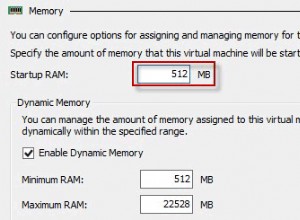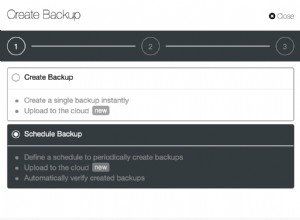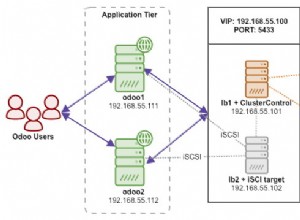नीचे (लगभग) पूरा कोड स्निपेट है:
# ... omitted import statements and session configuration
def _date(date_str):
return datetime.strptime(date_str, "%Y-%m-%d")
class Match(Base):
__tablename__ = "match"
match_id = Column(Integer, primary_key=True)
date = Column(Date, nullable=False)
@hybrid_method
def match_count(self, timespan_days):
cut_off = self.date - timedelta(days=timespan_days)
sess = object_session(self)
M = Match
q = (
sess.query(M)
# .filter(M.match_id != self.match_id) # option-1: only other on the same day
.filter(M.match_id < self.match_id) # option-2: only smaller-id on the same day (as in OP)
.filter(M.date <= self.date)
.filter(M.date >= cut_off)
)
return q.count()
@match_count.expression
def match_count(cls, timespan_days):
M = aliased(Match, name="other")
cut_off = cls.date - timespan_days
q = (
select([func.count(M.match_id)])
# .filter(Match.match_id != self.match_id) # option-1: only other on the same day
.where(M.match_id < cls.match_id) # option-2: only smaller-id on the same day (as in OP)
.where(M.date <= cls.date)
.where(M.date >= cut_off)
)
return q.label("match_count")
def test():
Base.metadata.drop_all()
Base.metadata.create_all()
from sys import version_info as py_version
from sqlalchemy import __version__ as sa_version
print(f"PY version={py_version}")
print(f"SA version={sa_version}")
print(f"SA engine={engine.name}")
print("=" * 80)
# 1. test data
matches = [
Match(date=_date("2020-01-01")),
Match(date=_date("2020-01-02")),
Match(date=_date("2020-01-03")),
Match(date=_date("2020-01-05")),
Match(date=_date("2020-01-05")),
Match(date=_date("2020-01-10")),
]
session.add_all(matches)
session.commit()
print("=" * 80)
# 2. test query in "in-memory"
for m in session.query(Match):
print(m, m.match_count(3))
print("=" * 80)
# 3. test query on "SQL"
session.expunge_all()
q = session.query(Match, Match.match_count(3))
for match, match_count in q:
print(match, match_count)
print("=" * 80)
if __name__ == "__main__":
test()
उपरोक्त कोड निम्न आउटपुट उत्पन्न करता है:
============================================================
PY version=sys.version_info(major=3, minor=8, micro=1, releaselevel='final', serial=0)
SA version=1.3.20
SA engine=postgresql
============================================================
<Match(date=datetime.date(2020, 1, 1), match_id=1)> 0
<Match(date=datetime.date(2020, 1, 2), match_id=2)> 1
<Match(date=datetime.date(2020, 1, 3), match_id=3)> 2
<Match(date=datetime.date(2020, 1, 5), match_id=4)> 2
<Match(date=datetime.date(2020, 1, 5), match_id=5)> 3
<Match(date=datetime.date(2020, 1, 10), match_id=6)> 0
============================================================
<Match(date=datetime.date(2020, 1, 1), match_id=1)> 0
<Match(date=datetime.date(2020, 1, 2), match_id=2)> 1
<Match(date=datetime.date(2020, 1, 3), match_id=3)> 2
<Match(date=datetime.date(2020, 1, 5), match_id=4)> 2
<Match(date=datetime.date(2020, 1, 5), match_id=5)> 3
<Match(date=datetime.date(2020, 1, 10), match_id=6)> 0
============================================================
जबकि क्वेरी q नीचे चाहते हैं (postgresql में) ):
SELECT match.match_id,
match.date,
(SELECT count(other.match_id) AS count_1
FROM match AS other
WHERE other.match_id < match.match_id
AND other.date <= match.date
AND other.date >= match.date - %(date_1)s) AS match_count
FROM match
एक बात जो मैं बताना चाहूंगा वह यह है कि "इन-मेमोरी" चेक बहुत कुशल नहीं है, क्योंकि प्रत्येक को प्रत्येक Match के लिए डेटाबेस से पूछताछ करनी होती है। उदाहरण। इसलिए, यदि संभव हो तो मैं अंतिम प्रश्न का उपयोग करूंगा।




